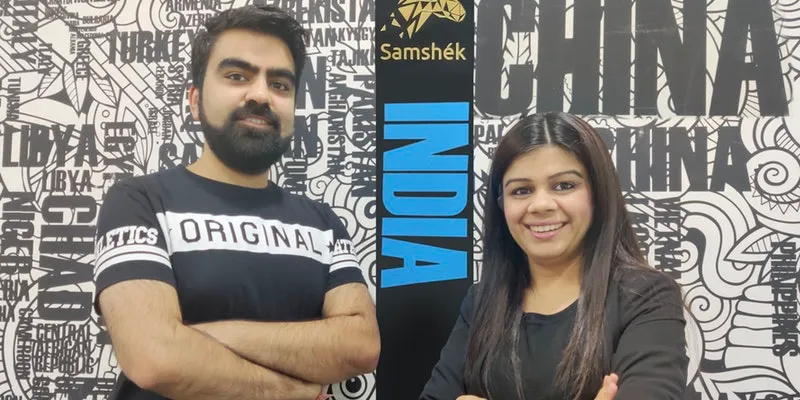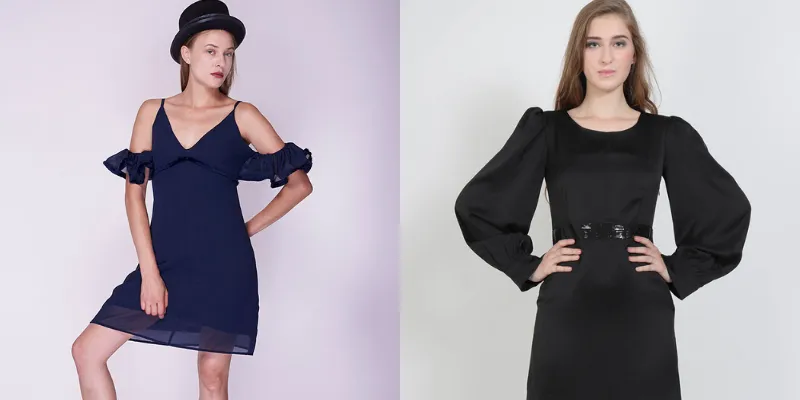This Delhi-based company makes customised outfits using 3D scanner, gets 300 orders per month
To solve the problem of women who face sizing and sustainability issues from their outfits, Samiskha Bajaj and Abhishek Bajaj launched Samshék, one of India’s first fashion-tech company that takes body measurements through 3D scanner. In a span of five years, the company now clocks 45 lakh turnover.
When out for shopping, it is a big hassle for women to get hands-on a perfectly sized outfit. While some dresses don’t fit the body type, there is some collection that catch the eyeball but is not preferential. Handpicking each dress and pondering if it would have a particular neck shape, sleeve type, or length is always disheartening.

Abhishek Bajaj and Samiksha Bajaj, Cofounders, Samshék
Seeing this huge gap, a brother-sister duo, Samiksha Bajaj and Abhishek Bajaj founded in 2015, one of India’s first fashion-tech company, based out of New Delhi.
In an interaction with SMBStory, Samiksha who holds a dual degree in MA fashion entrepreneurship and innovation from the London College of Fashion says,
“After completing my course, I worked with London Fashion Week. What I realised is that the problem everywhere is the same. Women always face difficulty finding the right size and desirable design. I heard about body scanners and customisation options in London and thought to discuss it with Abhishek if we can do something about it.”
Thus, Samshék was born on a phone call from London to Washington as both Samiskha and Abhishek got aligned with the concept of bringing forth fashion stores that offer digital personalisation of outfits at both platforms -- retail and online.
Edited excerpts from the interview:
SMBStory: What is Samshék?
Samiksha Bajaj: Understanding the issues of the garment industry and how drastically it is affecting the environment really gave Abhishek and I the push to incorporate tech into fashion.
In an era of fast fashion where approx. 3.8 billion clothing is dumped annually, Samshék is one of the first tech company that effectively combines technology and fashion to solve the two major issues of the garment industry - sizing and sustainability.
At Samshék, measurements are taken using a 3D body scanner that eliminates the retail sizing standards and accepting personalised measurement system to deliver the accurate fit in each garment.

Samshék's collection
We have both offline and online presence. If a customer wants to shop offline, we have a store at Season’s Mall, Pune. The customer can step in where the measurement is taken through a 3D body scanner. They can select the outfit and customise as per their wish by altering the colour, neckline, sleeve, sleeve length dress length as per the body shape. However, if they do not want to customise, they can shop from our ready-to-wear section.
The customised orders get delivered at the doorstep in just 48 hours.
For online mode, customers can place an order through our website selecting the customisation option. The delivery for online orders takes five business days PAN India.
Our target audience is generally women above the age of 35. After a certain age, women’s bodies start to change and they become unsure about their size. In such a case, a body scan proves to be very helpful as it helps them in analysing their body measurements and shop accordingly.
Investors didn’t believe in us and so we initially bootstrapped Rs 1 crore. Later, we took a startup India loan for expansion.
In a span of five years, Samshék is able to attract 200-300 orders every month and clocks an annual turnover of Rs 45 lakh.
Samshék is also available on ecommerce portals like Nykaa, Amazon, and Myntra giving the size options till 5XL.
SMBS: How are you using the digital platform in your business journey?
SB: For a consumer, finding the right size for one’s body shape is often challenging, as the retail industry has no set standard sizing system for all brands. 3D body-scanning technology is the solution to these fitting challenges. The noncontact technology can be used to capture the shape of a human body via a line of laser lights or a camera.
A 3D body scanner is an inbuilt device that scans your body and takes 110 body measurements in just five seconds. The data that is collected then helps in creating a digitalised system for virtual styling platform which analyses what clothing can be worn according to what body type.
We also use digital customisation process through virtual screens present at the store. A person can physically see all the customisation changes (neckline, colour, sleeve, dress length, etc.) on the model and choose the most suitable option. There are 1,500 customisation styles for each design.
Mass production leads to textile waste resulting in environmental degradation (the textile industry is the second-largest polluter after oil). On the sustainability front, we work towards zero waste policy and keep digital or virtual inventory instead of actual inventory. Each and every order is made for the very first time and hence their industrial waste is minimal. Digital inventory leads to no excess unused inventory which ultimately leads to no textile waste.

Samshék's collection
SMBS: From where do you source the fabric and what are the major challenges you come across?
SB: All the fabrics are sourced from India except leather, crushable, and polyester fabric, which is sourced from China and are tailored through the manual process.
Creating a strong, creative and motivated team is one of the biggest challenges. Also, though size and sustainability are the prime complaints of the customers, they are resistant to change. Raising awareness about the concept in terms of technology, role of digital fashion, and the importance of fashion sustainability is a lot more challenging.
SMBS: What are your future prospects?
SB: Our vision is to be at the forefront of technology and fashion, and rejuvenate fashion through technology to create an industry which is efficient yet sustainable. We are planning to introduce virtual mirrors and come up with more offline stores in a few years.
We are also planning to switch to automated robotic manufacturing from manual tailoring.
(Edited by Javed Gaihlot)









